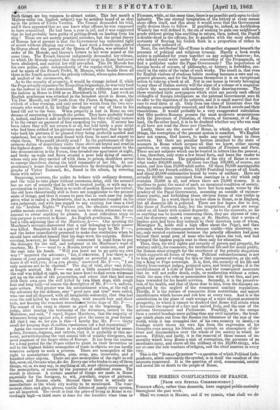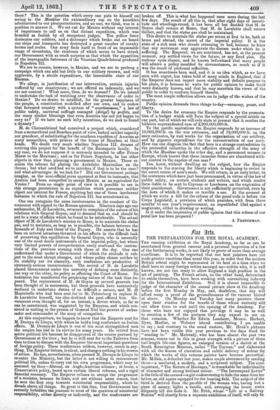'THE FOREIGN COMPLICATIONS OF FRANCE.
FROM OUR SPECIAL CORRESPONDENT.]
'FOREIGN affairs, rather than domestic, have engaged public curiosity throughout the past week. Shall we remain in Mexico, and if IV@ ;wain, what shall we do there ? This is the question which every one puts to himself on seeing in • the lioniteter the extraordinary rap on the knuckles administered to our plenipotentiaries, and no one, we think, was in a position to answer it. We set out for Mexico without any interest of importance to call us on that distant expedition, which was branded as foolish by all competent judges. The yellow fever decimates our soldiers, and a distemper which broke out on board our ships and transports has destroyed a great number of cavalry horses and mules. Our army finds itself in front of an impassable range of niountains, the existence of which seems to have struck our Government with as much surprise as that which the apparition of the impregnable fortresses of the Venetian Quadrilateral produced in Napoleon III.
We are to remain, however, in Mexico, and we are to prolong a campaign which can add but little to our military renown, and will aggravate, by a sterile expenditure, the lamentable state of our finances.
We allege, in justification of our intervention, certain injuries suffered by our countrymen ; we are offered an indemnity, and we are not content ! What more, then, do we demand ? Do we intend to undertake the task of watching over the observance of order in Mexico ? Do we desire to establish, for the greater happiness of the people, a constitution modelled after our own, and to endow that favoured country with a system of " avertissemens," a law of public safety, universal suffrage managed (dirige) by prifels, and the many similar blessings that even America has not yet begun to envy us? If we have no such lofty intentions, do we seek to found a dynasty ?
M. de Chateaubriand had conceived a project which, considered from a monarchical and Bourbon point of view, lacked neither capacity nor grandeur, of substituting for the southern republics cf America as many monarchies, with princes of the house of Bourbon at their heads. We doubt very much whether Napoleon III. dreams of reviving this project for the benefit of the Buonaparte family. In any case, we do not suppose it is seriously intended to offer Prince Murat to the Mexicans ; and as for Prince Napoleon, he has other objects in view than planning a government in Mexico. There re- mains the scheme for placing the Archduke Maximilian on the throne ; but what need had we to interfere if that is to be the case? and what advantages do we look for ? Did our Government perhaps imagine, as the semi-official press appeared at first to insinuate, that Austria had been compelled to accept Mexico as an equivalent for Venice ? From no single point of view is it possible to see in this strange persistence in an expedition which possesses neither object nor interest for France, anything but one of those incoherent fantasies to which the rule of Napoleon III. has accustomed us.
One can recognize the same incoherencies in the conduct of Go- vernment with regard to the Roman question. Nineteen days ago our ambassador, M. de Lavalette, returned to complain of the nature of his relations with General Goyon and to demand that an end should be put to a state of affairs which lie found to be intolerable. The actual object of M. de Lavalette's mission to Rome, is to maintain the status quo, and to maintain, as long as is possible, the balance between the demands of Italy and those of the Papacy. He asserts that he has been on several occasions thwarted in his efforts in the difficult task of preserving this equilibrium by General Goyon, who is assuredly one of the most docile instruments of the imperial policy, but whose very limited powers of comprehension easily confound the instruc- tions of the previous evening with those of the day. One can understand that wider a Government of which the attitude is sub- ject to the most abrupt changes, and whose policy shines neither by its stability nor its sincerity, such confusions are productive of extremely serious inconvenience. The arrival of M. de Lavalette placed •Government under the necessity. of defining more distinctly, one way or the other, its policy as affecting the Court of Rome. Its hesitation has manifested the perplexing nature of the task thus im- posed. The replacement of M. de Goyon ny several generals has been thought of in succession, but those generals have successively declined to undertake duties of so difficult a nature, and M. de Montebello who had been sent for to St. Petersburg to replace M. de Lavalette himself, has also declined the post offered him. Go- vernment even thought of, for an instant, a device which, as far as can be ascertained, was suggested by the Empress, and which con- sisted in uniting in the person of General Niel the powers of ambas- sador and commander of the army of occupation.
At this conjuncture, we happen to know that the Emperor sent for M. Drouyn de Lhuys, with whom he held a long conference on Italian affairs. M. Drouyn de Lhuys is one of the most distinguished men the empire has had in its service for many years. He retired from active political life because he disapproved of the course pursued by Government at the time ; but he is still sent for to the Tuileries from time to time to discuss with the Emperor the most important questions of foreign policy. These conferences seldom, however, result in any- thing. The Emperor listens, is silent, and changes nothing in his course of action. He has, nevertheless, often pressed M. Drouyn de Lhuys to re-enter the Ministry, but the latter is not willing to recommence political life, unless to carry out his own programme, which may be summed up thus—Abroad, an Anglo-Austrian alliance ; at home, a Conservative policy, based upon certain liberal reforms, and a rigid financial economy. The Emperor refuses to accept the programme of a minister, because he fears, and not without some reason, that he sees the first step towards ministerial responsibility, which he dreads above all things. So ggreat is this fear, that Government has recently forbidden the journals to treat of the question of ministerial responsibility, either directly or indirectly, and the conferences are broken off. This is what has happened once more during the last few days. The result of all this is, that after eight days of incerti- tude and wheelings-round, it has been all but decided. that M. de Goyon shall remain at Rome, that M. de Lavalette shall return thither, and that the status quo shall be maintained. This desire to maintain the status quo seems at first to be, both at home and abroad, the secret of the imperialpolicy. It is the state of a sick man who dreads returning to bed because he fears that any movement may aggravate the disease under which he is suffering. The Emperor, we are convinced, has not, at the present moment, any settled views for the future, or any fixed plan. He reckons upon chance, and he knows beforehand that many people will admire a policy moulded by circumstances, as much as if it was the result of profound reflection.
It has sometimes been said, and it is an idea which, as we have seen with regret, has taken hold of many minds in England, that if the Emperor does not impart more stability and definite purpose to his plans, it is because he waits for public opinion to make itself more distinctly known, and that he may ascertain the views of the public in order to conform himself thereto.
The most simple reflection allows me to judge of the wishes of the country.
Public opinion demands three things to-day—economy, peace, and liberty. To the desire for economy the Empire responds by the presenta- tion of a budget which will form the subject of a special article on our part, but of which we will only state at present that it reaches the hitherto unprecedented sum of 2,900,000,000 fr.
To the pacific aspirations the Empire responds by an increase of 10,000,000 fr. on the war estimates, and of 18,000,000 fr. on the navy estimates, by vast works for the organisation of our artillery, and by gigantic expenditure for the reconstruction of our navy. How can one disguise the fact that here is a strange contradiction to the pretended reduction in the effective strength of the army of which the Monileur spoke the other day, and a permanent menace to Europe, which knows that these immense forces are abandoned with- out control to the caprice of one man ? You know, without dwelling on the subject, how the Empire responds to the craving for liberty which is beginning to revive in the secret recess of men's souls. We will return, in an early letter, to the sentences which have just been pronounced, in virtue of the law of public safety, on certain students and writers, and which render them liable to be sent to Cayenne or Lambessa on the expiration of their punishment. Government is not sufficiently protected, even by the laws of which it makes so terrible a use. At the moment at which we write a bill for the reform of the penal code is before the Corps Legislatif, a provision of which punishes, with from three months' to one year's imprisonment, an unpublished libel against a magistrate, either in drawing or writing.
Is it under the inspiration of public opinion that this reform of our penal law has been prepared ?
A hisscinsair.































 Previous page
Previous page